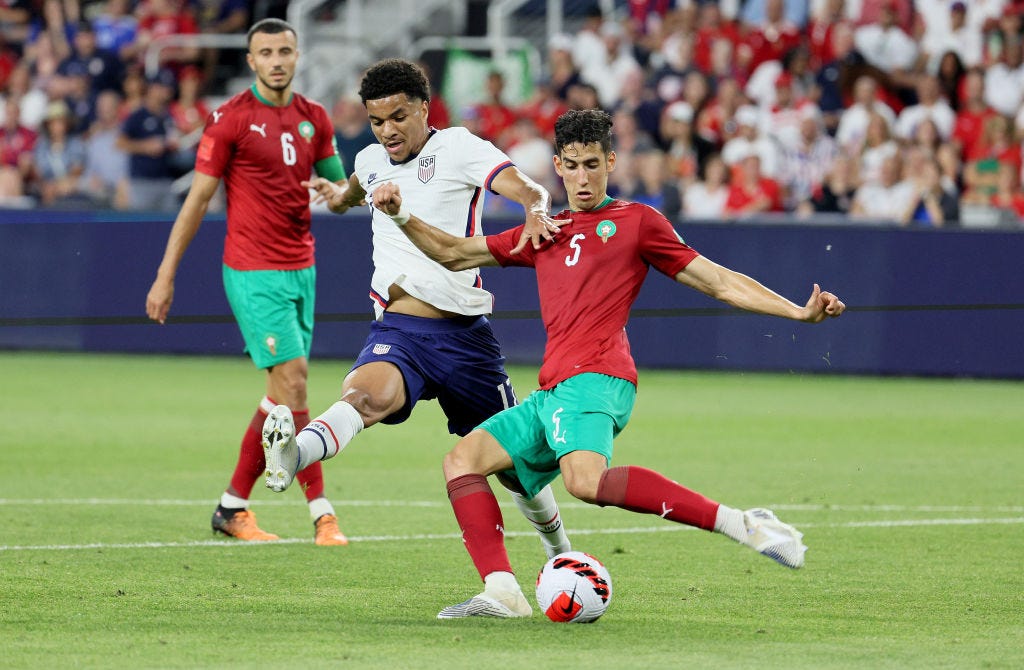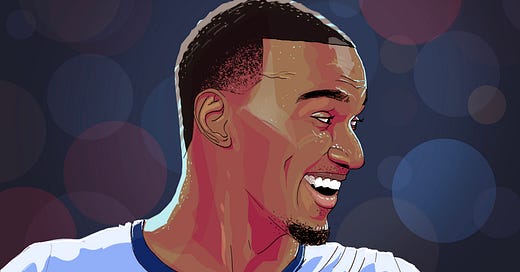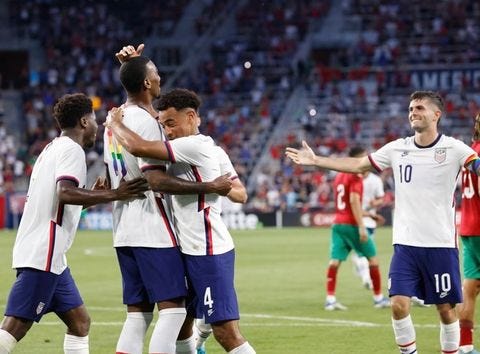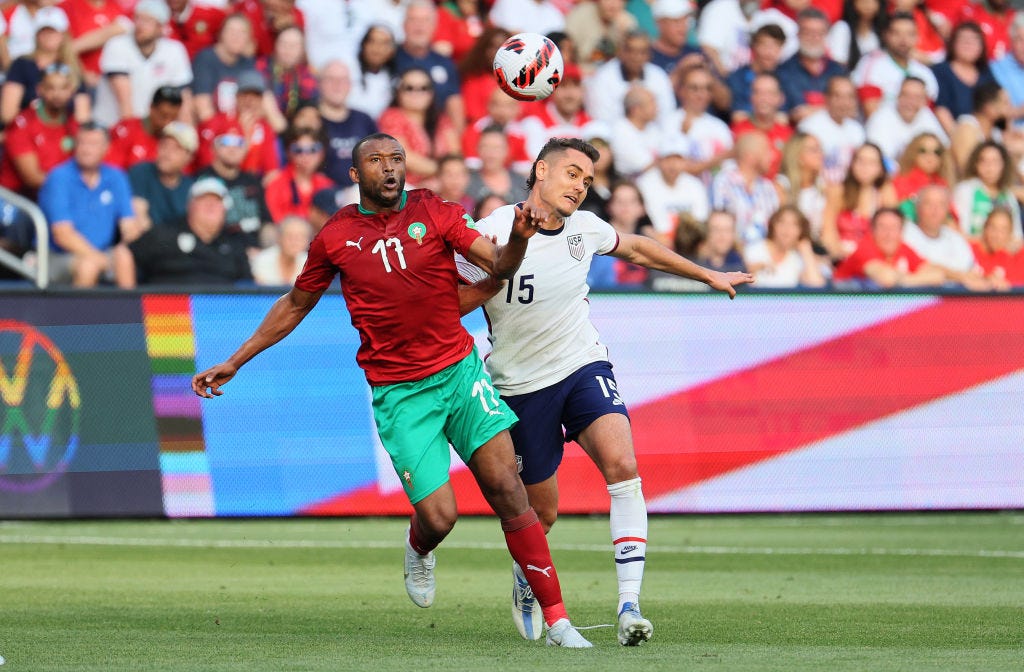Premium: Coming Full Circle
As kids, Haji Wright and Christian Pulisic always thought they'd play together on the USMNT. It took years longer than expected, but they finally did in a special moment against Morocco.
CINCINNATI — All superstar athletes have someone. That person they grew up with, the player they thought was a can’t-miss prospect, who missed. You never knew entirely why. Sometimes the reasons were situational, or bad choices, or a failure to keep improving, or injuries, or just plain old bad luck. But superstars never forget that teammate or opponent from long ago who should have made it big but never did.
For a few years, it looked like that person for Christian Pulisic was Haji Wright. Eight years ago, when they played on the U.S. Under-17 national team together, it was Wright who was the more coveted future star—a strapping and prolific striker—and Pulisic who was the undersized but still creative midfielder. “That was the duo back in the day, me and Haji,” Pulisic said with a smile this week. “We played a lot of games together in the youth national teams.”
GrantWahl.com is a reader-supported soccer newsletter. Quality journalism requires resources. The best way to support me and my work is by taking out a paid subscription now. Free 7-day trials are available.
In January 2014, Borussia Dortmund sent scouts to a youth tournament in Turkey to take a close look at Wright playing with the U.S. Under-17s. But a funny thing happened that week, the kind of plot twist that can change careers and even lives: While they were observing Wright, Dortmund’s scouts fell in love with his slight 15-year-old teammate. Pulisic.
“We said, ‘Hey, [Wright] is a really good player, but there’s one fantastic, outstanding player,’” former Dortmund sporting director Michael Zorc told me, referring to Pulisic. “From this time we followed him and tried to realize the transfer.”

Pulisic moved with his father, Mark, to Germany in the summer of 2014, and in 2016 he broke through with Dortmund and the USMNT. Meanwhile, Wright struggled to make his mark on Schalke’s first team in three seasons with the German club (which happened to be Dortmund’s archrival). Released by Schalke in 2019, he signed as a free agent with the Dutch club VVV-Venlo, only to be released and sign in 2020 as a free agent with Denmark’s SønderjyskE.
Wright moved again last summer on loan to Antalyaspor in the Turkish top flight, and finally, at 24, he broke through with 14 goals in 32 appearances this season. The U.S.’s No. 9 position has been a revolving door throughout qualifying, and five months before the World Cup, coach Gregg Berhalter decided to call up Wright and give him a shot.
On Wednesday night, in his first appearance for the USMNT, Wright was on the field with the U.S. leading Morocco 2-0 in the second half when Pulisic earned a penalty. Normally, the Chelsea star would take the spot kick himself. International goals are precious, and someday Pulisic (with 21) will likely challenge to break the USMNT record (57) shared by Landon Donovan and Clint Dempsey. Both those players would tell you they wish they’d scored just one more (even though it seems appropriate now that they finished tied).

But instead of taking the penalty, Pulisic gave up the opportunity and handed the ball to his old friend.
Wright converted. And his teammates, including Pulisic and other former youth national-teamers like Tyler Adams and Weston McKennie, celebrated in a way that told you something important had just happened.
After the U.S.’s 3-0 friendly victory, Wright posted several photos on Instagram, including one of himself and Pulisic in the old days, with a message: “Unbelievably grateful to my Friend, Brother, and Captain #Debut”
“It’s his first game with the senior team,” said Pulisic, who posted the same picture on his IG, “and I just wanted to give him a bit of confidence. I’m happy to see him score.”
A lot can happen in the next five months, and there’s no guarantee that Wright will make the World Cup team. But we do know this: He’s got a chance. He’s still just 24. And it was far too soon to say that he was the can’t-miss prospect who missed.
Pulisic had a terrific game, and the image that will probably last the longest is his otherworldly first touch on Walker Zimmerman’s ball over the top in the first half that Pulisic somehow saw coming over his shoulder and cradled like the famous Willie Mays baseball catch. He then pulled back, saw two Moroccan defenders rush by him, and fed Brenden Aaronson for the opening goal.
I couldn’t help but ask Pulisic afterward: How hard was that to pull off? He grinned. “I guess for you guys it might not be easy, but I've been training this my whole life,” he said. “So for me, that's the touch that I expect myself to make. But yeah, maybe not for everyone.”
Berhalter gave the play some more context. “That’s what separates really good players from great players,” he explained, “the ability to take the touch and control the ball at high speed. And you see when he touches the ball, it's right at his foot … The ability of players to control the ball at high speed and change direction at high speed with the ball is what really separates players at the next level. And Christian definitely has that.”
For this game, Berhalter tweaked his formation so that in possession it was what he called a 3-2-2-3, giving Pulisic and Aaronson creative license centrally between the lines to unbalance the Moroccan defense. In the process, Pulisic cut in from the left and Jedi Robinson (and later Joe Scally) pushed up to fill the gap on the left wing. It was largely effective and gave Pulisic and Aaronson the chance to be on the same wavelength in their combinations.
“We think that it's a very difficult formation to play against, to build pressure against,” Berhalter explained. “If you want to really commit to building pressure, you have to bring numbers forward. And once you bring numbers forward, there are spaces that open up on the side of the field and between the lines. So we wanted to use Christian and Brenden in those positions to really hurt the opponent and then still have three guys high on the back line that could be running behind them and keeping their [back] five pinned back.”
How the U.S. will approach Uruguay, another World Cup team, in Sunday’s friendly remains to be seen, but it’s a good thing to know that the U.S. can come up with variations in its tactical schemes and see them work.
Hard as it may be to believe, the three USMNT home games over the next week are the last matches the team will have on home soil before the World Cup starts in November. As a result, U.S. Soccer decided to make every player on the roster available to the media in 15-minute groups of two over Monday and Tuesday in Cincinnati. It was a chance for reporters to get material in their notebooks to use closer to the World Cup—and to take the temperature of every player on the roster.
What stood out the most from those interviews? Here’s a selection:
• Miles Robinson’s U.S. teammates—even those competing against him for playing time—felt real pain about the torn Achilles that could keep him out of the World Cup. One sign of a good team culture is that the players all seem to care about each other, and that was a common thread in what teammates said about Robinson, whose World Cup participation is in real danger after he suffered a left Achilles tear in a recent game for Atlanta United.
Aaron Long, who started in place of Robinson on Wednesday, recently recovered from the same Achilles injury, and he said he’s speaking to Robinson at least once a week these days.
When Zimmerman notified Long that Robinson had done his Achilles, Long said, “It was like heartbreak and an instant ‘I need to be the one that reaches out to him as fast as possible to let him know that I’ve been through this, and I will help him through this process.’ I know exactly where he’s going to be, and it’s not always like that when someone gets injured around you. You have your teammates, and they’re your brothers. And to just have gone through this, I felt obviously a little bit more inclined to reach out and be the guy to help him through certain moments.”
• Zimmerman has become the team’s most prominent domestic-based leader. As recently as last October, Zimmerman was left off Berhalter’s original squad list for World Cup qualifiers and only joined the team when Tim Ream was unable to make it. Since then, Zimmerman has become a rock in the central defense, and at 29 he’s older than most of the other starters. That led to him playing the largest role of any men’s team player in the recent collective bargaining deal, one that also ensured true equal pay with the USWNT.
I actually think Zimmerman has a chance to be the team’s breakout star of the World Cup, much in the same way that Alexi Lalas broke out at the 1994 World Cup.
“Being in the group a lot has helped obviously with continuity and respect from other players, and kind of being able to have that leadership type of position,” Zimmerman said. “Qualifying was a big step for me, just in terms of being a regular contributor, and kind of gave me the opportunity to maybe be a little bit more of a leader in some ways. And then certainly CBA stuff and representation. I think it’s very important that we have people who are educated in the process and proud of the history of the men’s national team and the history of the women’s national team—and also excited about the future of it and connecting these few generations. We do have a lot of young guys on our team and not a ton of old guys. And so realizing that, okay, even though maybe we aren’t as old as some of the people who were playing before us, we have to kind of step up into that role.”
Zimmerman added to me with a smile that he might be the first USMNT player to take advantage of the new CBA’s childcare provision that has been extended to the men’s team in addition to the women’s team. If he brings his one-year-old son, Tucker, to a USMNT camp, he says he can give his wife, Sally, a few days off back home.
• The USMNT’s stance toward human rights in Qatar is “Be the Change.” Not long after the police murder of George Floyd in 2020, the U.S. men started wearing warmups that said BE THE CHANGE. That’s clearly the message that the players want to send about Qatar and its poor human rights record heading into the World Cup there. For the first time, U.S. players were asked this week about what they might do regarding Qatar and human rights, and the phrase came up often in their responses.
“We have a big role within our team,” said McKennie. “We always discuss being the change, and we’ve definitely been in discussions [on Qatar]. It started over a year ago within this team and bringing in people to inform us on everything that’s going on. And we’ll definitely discuss within the team the type of gestures and things we want to do whenever we get to the World Cup and leading up to the World Cup.”

• Matt Turner thinks he can compete to win the Arsenal starting job. There are obviously concerns that the top three U.S. goalkeepers are set to be backups in the Premier League next season with Zack Steffen (Man City), Turner (Arsenal) and Ethan Horvath (Nottingham Forest). But Turner, who started on Wednesday in the absence of Steffen (for family reasons), isn’t just assuming he’ll be the backup at Arsenal behind Aaron Ramsdale when he joins the squad next month.
“I’m in this game to put my best foot forward no matter what,” Turner said. “If you’re going to tell me that somebody is a No. 1 or a position is completely set, I’m not sure I really buy that. Because in professional sports, you always have to show up and you always have to put your best performances out there if you want to maintain. Because you can have something, but you need to maintain it and be consistent over a number of games or a number of years.”
• Aaronson has a message for England. Fresh off his $30 million transfer to Leeds United from Salzburg, the American attacker didn’t waste any time saying what his goals are in Qatar—including in the U.S.’s Black Friday Game 2 against England, which reached the final of last year’s Euros and the semifinals of the 2018 World Cup.
“We’re not going to go to the World Cup to be a participant,” Aaronson said. “We’re going there to win. And England’s in our group, and we’re going to try to win this game. So I think that we have no fear, and they should fear us.”

• Several top U.S. players were asked about their club futures. It’s always interesting this time of the year, after the end of the European club season, to see how players address public questions about their potential club transfers in the coming window. And the U.S.’s top stars—Pulisic, Adams and McKennie—all got questions this week. But they answered them with slightly different tones.
When Pulisic was asked if he’d met Chelsea’s new owners—led by American Todd Boehly—and whether he expected to be with the club at the start of next season, he answered the first part but didn’t touch the second.
“At the end of the season, we were able to meet with them, and they were around the club a lot, some of the owners,” Pulisic said. “Really good people. So I’m excited moving forward. As far as right now, I’m obviously just focused on what I’m doing here, and I’m super-excited to be here. And yeah, that’s it.”
For his part, Adams got asked about his future at Leipzig after not being a first-choice starter for much of the latter half of the season under Domenico Tedesco. “At Leipzig, obviously it was a difficult season for myself,” Adams said, “one where I think I should have been playing a little bit more towards the end of the season and getting that opportunity to play, especially based off the performances that I had. But yeah, we’ll see what the future holds.”
When McKennie got asked about rumors tying him to Premier League teams like Tottenham, he didn’t exactly dismiss them. “For me, wherever I end up, I normally try and find my way onto the field,” McKennie said. “So obviously the Premier League is a top-level league and a league that a lot of people dream of playing in. But as of right now, I’m just focused on the national team and being here, and after this is finished, then I’ll get in contact with my agent and talk everything through.”
• Malik Tillman has had a surreal week. In the span of a few days, the German American Bayern Munich II midfielder (who pronounces his first name MALL-eck) announced he had decided to represent the United States, made the first trip of his life to the U.S., joined his new teammates on his 21st birthday, heard Pulisic announce to the team that FIFA had approved his one-time nationality switch, made his USMNT debut against Morocco, and faced a phalanx of media asking him at times sensitive questions about his family, including whether he had seen his Detroit-born father in recent years. (He has not.)

That Tillman was willing to speak to the assembled media in somewhat limited English was impressive on his part. And he was quick to give credit to American teammates he’s had at Bayern—Chris Richards and Taylor Booth—for helping him decide to join the U.S. setup. “They told me it’s a great group of guys,” Tillman said. “The team has a lot of potential, and they also convinced me.”
• The USMNT’s eating pods are a thing of the past (for now). Never underestimate the power of being able to share meals together with your friends and colleagues. The USMNT has run a tight ship on COVID protocols over the last two years, which meant that players had been eating in four-person “pods” during each camp to minimize virus spread if someone was infected. But those rules have been relaxed during the current camp, and multiple players said they appreciated the chance to have more normal interactions with a greater number of teammates.
Five years after the U.S. was riven by factions, this team is united. And that chemistry will become even more important at the World Cup, which is drawing closer every day.









The culture that Berhalter has built with this group is worth way more than any formation or tactical tweak.
This is great stuff Grant - thanks.
I'm curious about your last paragraph, and the USMNT team being 'riven by factions' five years ago. Was this something that was obvious to reporters following the team? Could you see it coming a year before the WC? Or did it just sneak up on the team in the final months, and contributed to their poor showing? That team obviously didn't feel 'right' at that WC, but up until now I haven't seen that mentioned in an article.